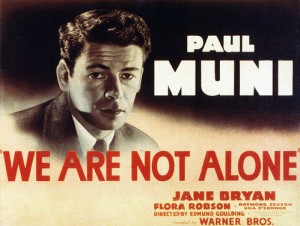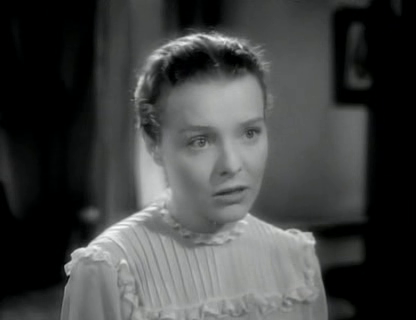“Did you really think I’d allow them to be together for another minute?”
|

Synopsis:
On the brink of World War I, a kind doctor (Paul Muni) hires a down-on-her-luck Austrian dancer (Jane Bryan) to be a governess for his high-needs son (Ramond Severn) — but when his shrewish wife (Flora Robson) learns about Bryan’s troubled past and insists that she leave, unforeseen trouble soon emerges.
|
|
Genres, Themes, Actors, and Directors:
- Cecil Kellaway Films
- Doctors and Nurses
- Falsely Accused
- Flora Robson Films
- Governesses and Nannies
- Marital Problems
- Paul Muni Films
Review:
Edmund Goulding’s adaptation of James Hilton’s 1937 novel — about an overly kindhearted doctor whose attempt to help a struggling young Austrian refugee leads to his downfall — remains an overlooked treat from what is often referred to as Hollywood’s “golden year” (1939). The ever-versatile Paul Muni effectively portrays a man so genuinely kindhearted as to border on foolish naivete, committed to his stern wife to an extent far beyond what most would tolerate, and unable to foresee the ramifications of inviting a beautiful young girl into his household; it’s fascinating to watch the subtlety of his growing understanding as the depths of his wife’s intolerance and jealousy are revealed. Robson, meanwhile, is remarkable in the undeniably tricky role as his wife — her portrayal is far from unilaterally shrewish, instead demonstrating the wealth of conflicted emotions behind her character’s every statement and action; while we despise her choices, we nonetheless understand on some level the thrust and sincerity of her convictions. Finally, Bryan — a gifted, glowing actress who gave up her career in Hollywood shortly after marrying — manages to elevate her character from merely the “other woman” into a believable portrayal of a scared refugee genuinely grateful for the assistance Muni innocently affords her. Unfortunately, the storyline goes on for about half an hour too long, and eventually devolves into an unnecessarily metaphorical commentary on wartime prejudices — but the tale until then is a compelling one of a household torn apart by a tragic conflict of attitudes and priorities.
Redeeming Qualities and Moments:
- Paul Muni as Dr. Newcome

- Flora Robson as Jessica Newcome

- Jane Bryan as Leni

- Atmospheric cinematography

Must See?
Yes, as a most enjoyable “forgotten” film.
Categories
Links:
|
3 thoughts on “We Are Not Alone (1939)”
First viewing. Not must-see.
Taking the opposite view here, since I find the second part of the film much more interesting than the first.
One might think, because Muni and Robson’s characters have a very young son – and not a grown one – their marriage relationship would be somewhat more civil, or at least not quite so harsh. But their life together actually makes little sense. Robson acts more like Muni’s mother – his gruff, demanding, impossible-to-please mother – than his wife. Why are these two people married?! Was Robson like this when Muni married her? If so, why would someone like him do that? If not, what changed her? (It would certainly have helped our understanding of Robson – and Muni – if we knew some of that stuff.)
For the first half of the movie, this is the kind of story in which the good are very good and the bad are very bad. There is not much in the way of shadings – such extremes are too sharp.
Fortunately (for the sake of the story’s initial conflict), things change midway: war breaks out, causing anti-German sentiment to invade the household. So the plot becomes more complicated, leading to a compelling, extended trial – all of which is nicely handled by director Goulding.
Still, the main characters remain one-dimensional. Admittedly, I am not a Muni fan – but, in his defense, Goulding has managed to get a more tempered performance than I might have expected from him. Even so, though Muni, Bryan and Severn (all the good people) get along well in their simpatico way, Muni and Robson seem to have no chemistry – not just as a warring couple but as actors.
I don’t tend to wonder why people got married (at least in the past) just because so many other factors were often at play besides chemistry or even interest. But I agree it would have helped a lot to have some clarifying dialogue around this.
Clarification of how things were between them and how things got as they are would help in assessing their relationship – which might possibly have altered my feeling about the first half of the film.
Though I don’t know to what extent. I’m still not a huge Muni fan (but that’s just me). Even though I think he’s more controlled here than I’ve seen him elsewhere, I get a ‘movie acting’ sense from him, which I don’t generally get from the actors surrounding him.